Find out the correct collective noun for doctors and elevate your medical vocabulary.
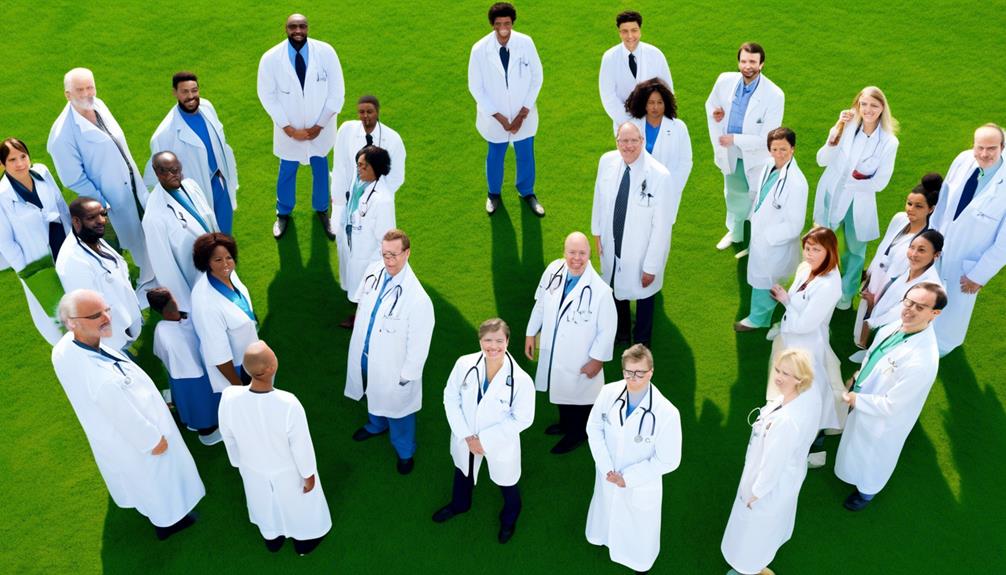
The Collective Noun for Doctors
Imagine you’re at a medical conference, surrounded by a myriad of physicians discussing the latest advancements in medicine.
You turn to your colleague and say, ‘Look at that…,’ but what’s the right term to finish that sentence? Is it a ‘group of doctors’, a ‘gaggle of doctors’, or something else entirely?
This might seem trivial, but the correct collective noun can add a touch of professionalism and precision to your language.
It’s time we explore the correct collective noun for doctors, enriching your vocabulary and elevating your communication skills in the process.
Key Takeaways
- Collective nouns represent a group or collection of people, animals, or things as a single entity, allowing for more concise and efficient communication.
- Collective nouns can be singular or plural, depending on the context, and using them correctly enhances precision and clarity in communication.
- Collective nouns originated in the Middle Ages as hunting terminologies and have since evolved to include people and objects, with some terms being counter-intuitive.
- In the medical field, collective nouns like ‘faculty’, ‘staff’, and ’round’ are used to depict professional group dynamics, teamwork, and shared responsibilities among healthcare professionals.
Understanding Collective Nouns
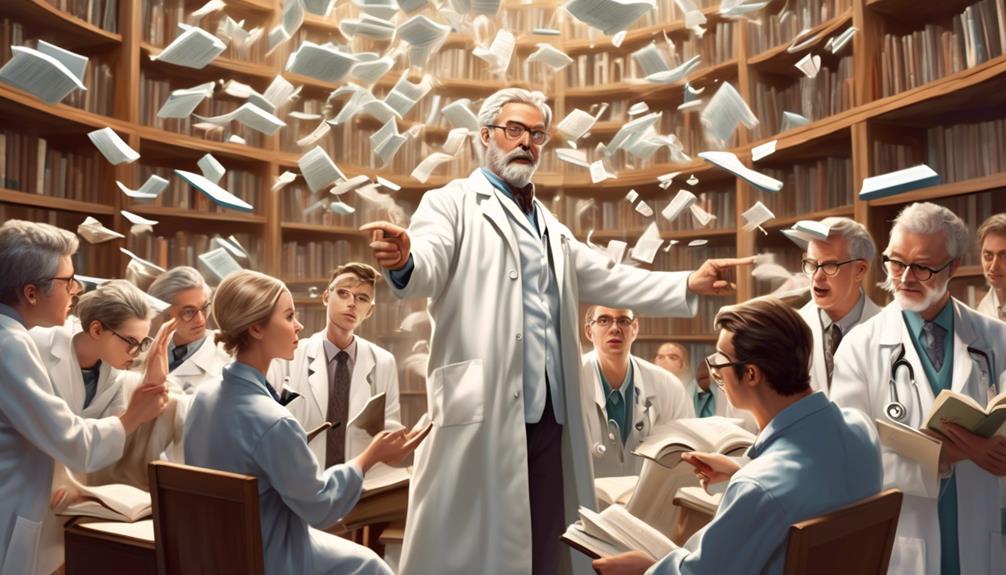
Before we delve into the specific collective noun for doctors, let’s take a moment to understand what collective nouns are and how they function in our language.
Collective nouns are unique in that they represent a group or collection of people, animals, or things as a single entity. They allow us to talk about groups in a more concise and efficient manner.
The peculiarity of collective nouns lies in their versatility. They can be singular or plural, depending on the context. If you’re referring to the group as a single unit, you’d use a singular verb. For instance, ‘The team is winning.’ But if you’re emphasizing the individuals within the group, you’d use a plural verb, like ‘The team are arguing amongst themselves.’
Understanding and using collective nouns correctly can enhance your precision and clarity in communication. They allow you to convey complex ideas succinctly, making your speech and writing more effective.
Now that you’ve got a handle on collective nouns, we can proceed to discuss the specific collective noun for doctors. Remember, language is an art, and collective nouns are one of its fascinating brush strokes.
Origins of Collective Nouns Usage
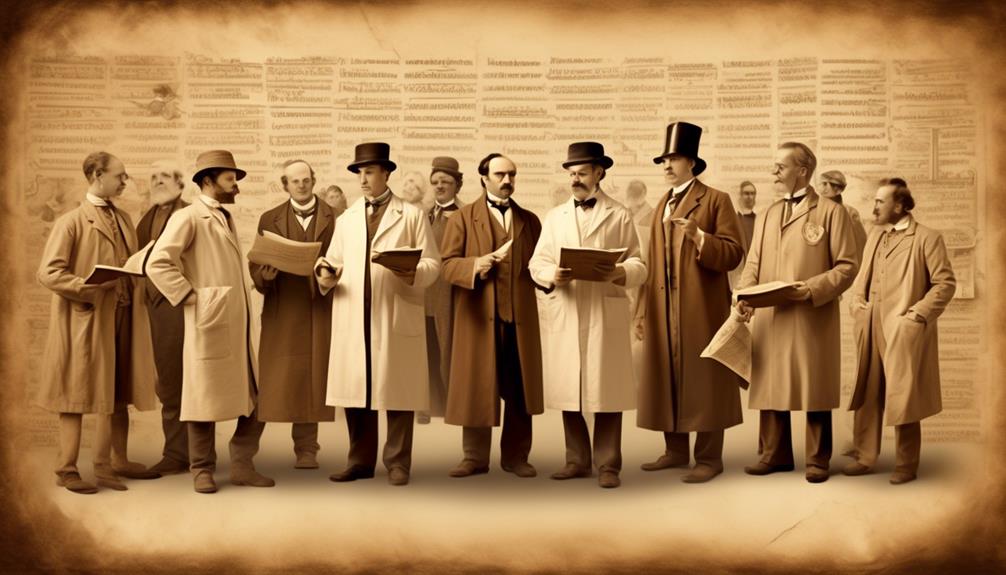
Tracing back the roots of collective noun usage, you’ll find that this linguistic tool has a rich history, embedded deeply in the English language. Collective nouns originated in the Middle Ages, primarily as hunting terminologies, giving groups of animals unique identifiers. They’ve since evolved, broadening their scope to include people and objects.
However, the adoption of collective nouns wasn’t without its complexities. You’ll notice that some collective nouns are counter-intuitive. For instance, ‘a murder of crows’ doesn’t connote violence but simply identifies a group of these birds. This peculiarity stems from the whimsical nature of medieval scribes, who delighted in coining these terms.
Remarkably, some of these antiquated terms have withstood the test of time, remaining in current usage. They’ve become ingrained in our language, showcasing our linguistic heritage. You’ll find them in literature, in everyday conversation, and even in specialized domains.
Collective Nouns in the Medical Field
Diving into the realm of the medical field, you’ll find that collective nouns take on a specialized role, embodying the professional group dynamics unique to healthcare professionals. These collective nouns not only refer to a group of people but also reflect the shared identity and unity within the profession.
Consider the term ‘faculty’. You’ll usually hear it in academia, but in the medical field, it’s used to denote a collective group of doctors or medical educators. It emphasizes their role in imparting knowledge and shaping future medical practitioners.
Similarly, ‘staff’ is a collective noun used to represent a group of healthcare professionals working in a hospital or clinic. This term underscores the team’s collaborative nature, where each member contributes to patient care and recovery.
On a more specialized note, ’round’ is a collective noun that refers to a group of doctors or medical students visiting patients for diagnosis and treatment updates. It signifies the collaborative decision-making process in patient care.
Thus, collective nouns in healthcare go beyond mere group identification; they depict teamwork, shared responsibilities, and professional cohesion. They’re not just words; they’re a reflection of the medical community’s ethos and shared mission.
The Proper Term for Group of Doctors
Now, let’s turn our attention to the specific term used for a group of doctors. You may already be familiar with collective nouns such as a ‘flock of birds’, a ‘school of fish’, or a ‘pride of lions’. But when it comes to the medical profession, what term do we use?
The collective noun for doctors is a ’round’. This term is often used in a hospital setting where you might hear of a ’round of doctors’ doing their rounds – checking on patients, discussing cases, and making decisions on treatment options. It’s a term that indicates not just a group of doctors, but a coordinated team working together.
Understanding this term helps to highlight the collaborative nature of modern medicine. Doctors don’t operate in isolation. They’re part of a larger team of healthcare professionals, each with their own roles and responsibilities. The term ’round’ captures this, reflecting the shared knowledge, collective decision-making, and teamwork that’s at the heart of the medical profession.
Examples and Usage in Sentences
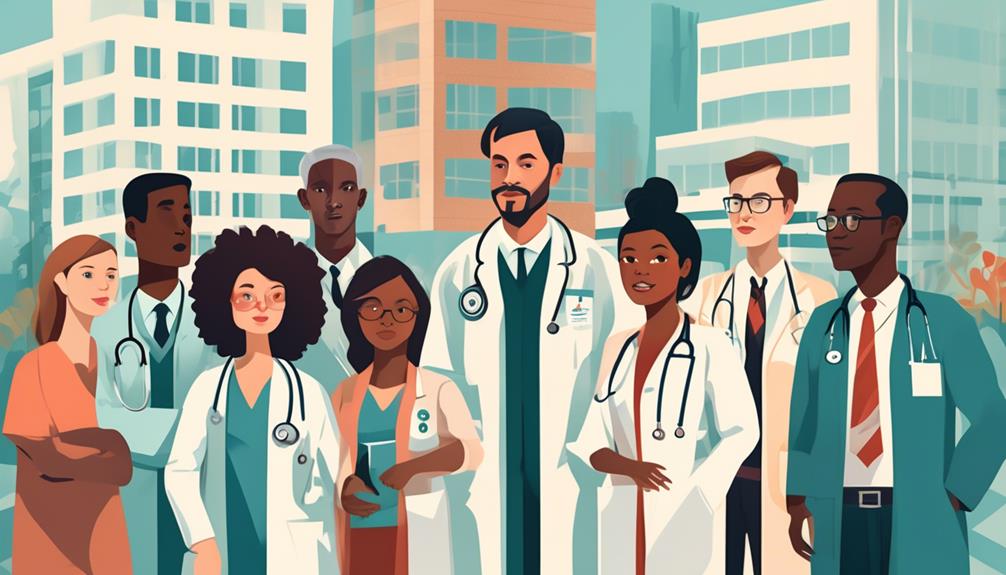
How might we use the term ’round’ in everyday language or medical context, you ask? It’s not as daunting as it seems.
In the medical realm, ’round’ is often used to describe a group of doctors. For instance, you might say, ‘The round of doctors made their early morning visit to check on the patients’ conditions.’ This typically refers to a regular visit made by a group of doctors to every patient in their care.
Outside the hospital, the term can still be used, though more metaphorically. Say you’re at a social gathering and there’s a group of physicians discussing the latest medical breakthroughs. You might comment, ‘There’s a round of doctors in the corner having a heated debate.’
Throughout, it’s important to remember that ’round’ refers to a collective group of doctors, not a single physician. Incorrect usage can lead to confusion. For instance, saying, ‘A round of doctor came to see me.’ is incorrect. Instead, you’d say, ‘A doctor from the round came to see me.’
Frequently Asked Questions
What Are Some Other Professions That Have Unique Collective Nouns?
You’re likely familiar with a pride of lions or a gaggle of geese, but other professions also have unique collective nouns.
Judges form a ‘bench,’ musicians can be a ‘band,’ and actors create a ‘cast.’
If you’re into birds, a collection of owls is a ‘parliament,’ and crows form a ‘murder.’
It’s interesting to note how these collective nouns often reflect some characteristic or stereotype of the profession or group they represent.
How Are New Collective Nouns Officially Recognized and Added to the Language?
You’re curious about how new collective nouns become official, right?
Well, it’s not a formal process. Typically, if a term gains widespread usage and understanding, it may be added to dictionaries. It’s all about how frequently and commonly it’s used in everyday language.
If you create a collective noun and it catches on, it could potentially become recognized officially. But remember, it’s the people’s acceptance that really determines its official status.
Are There Any Cultural Variations in Collective Nouns for Doctors in Different English-Speaking Countries?
You’re asking if there are cultural variations in collective nouns for doctors among English-speaking countries. It’s not common to find significant differences. Generally, a ‘group’ or ‘staff’ of doctors is universally accepted.
However, different workplaces or regions might use informal or colloquial terms, which aren’t standardized. It’s always possible to find unique, local variations in language, but these aren’t officially recognized or widely used.
Can a Collective Noun Be Used for a Group of Doctors With Different Specializations?
Absolutely, you can use a collective noun for a group of doctors with different specializations. It’s not a must for them to share the same specialty.
For instance, the term ‘staff’ can refer to a group of doctors, regardless of their specialties. So, you’re not restricted in this regard.
However, the use of specific collective nouns might provide more precision and clarity, especially in a professional context.
Are There Any Humorous or Unofficial Collective Nouns for a Group of Doctors?
You’re likely to find a range of humorous or unofficial collective nouns for doctors. Some use ‘a plague of doctors’ jokingly, due to the historical association with disease. Others prefer ‘a scribble of doctors,’ alluding to the stereotypically illegible handwriting.
These aren’t officially recognized, but they do provide some light-hearted fun when referring to groups of doctors. It’s all in good humor and definitely not meant to offend.
Conclusion
So, you’ve journeyed through the intriguing world of collective nouns, delving into its origins and its application in the medical field.
You’ve discovered that the proper term for a group of doctors is a ’round’ or ‘board’. These terms, once unfamiliar, now provide a precise way to reference such a group in conversation or writing.
Remember, language is dynamic and understanding nuances like these can elevate your communication skills significantly.



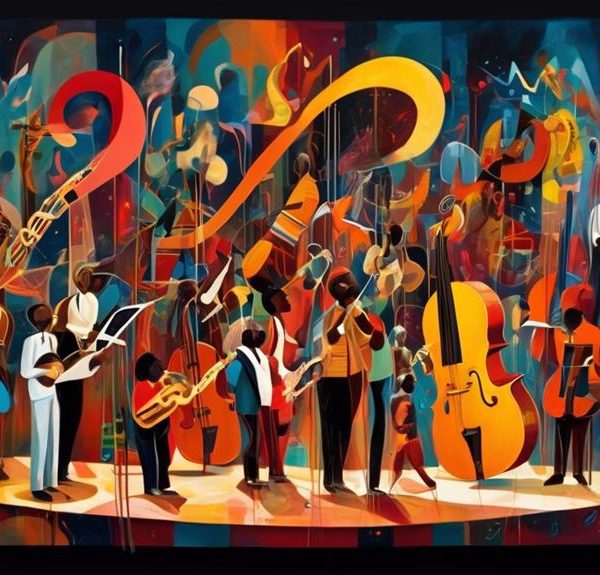

Sign up